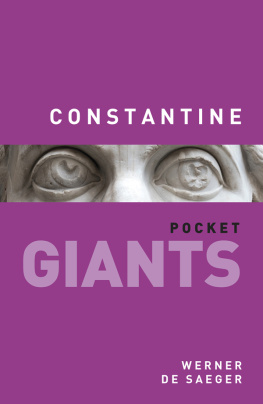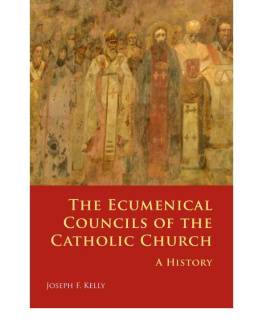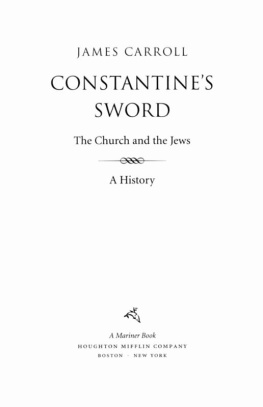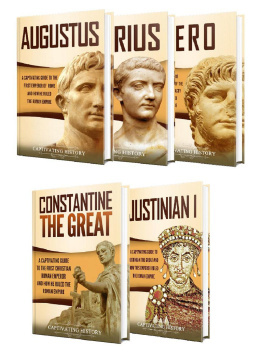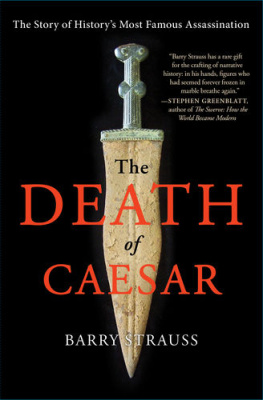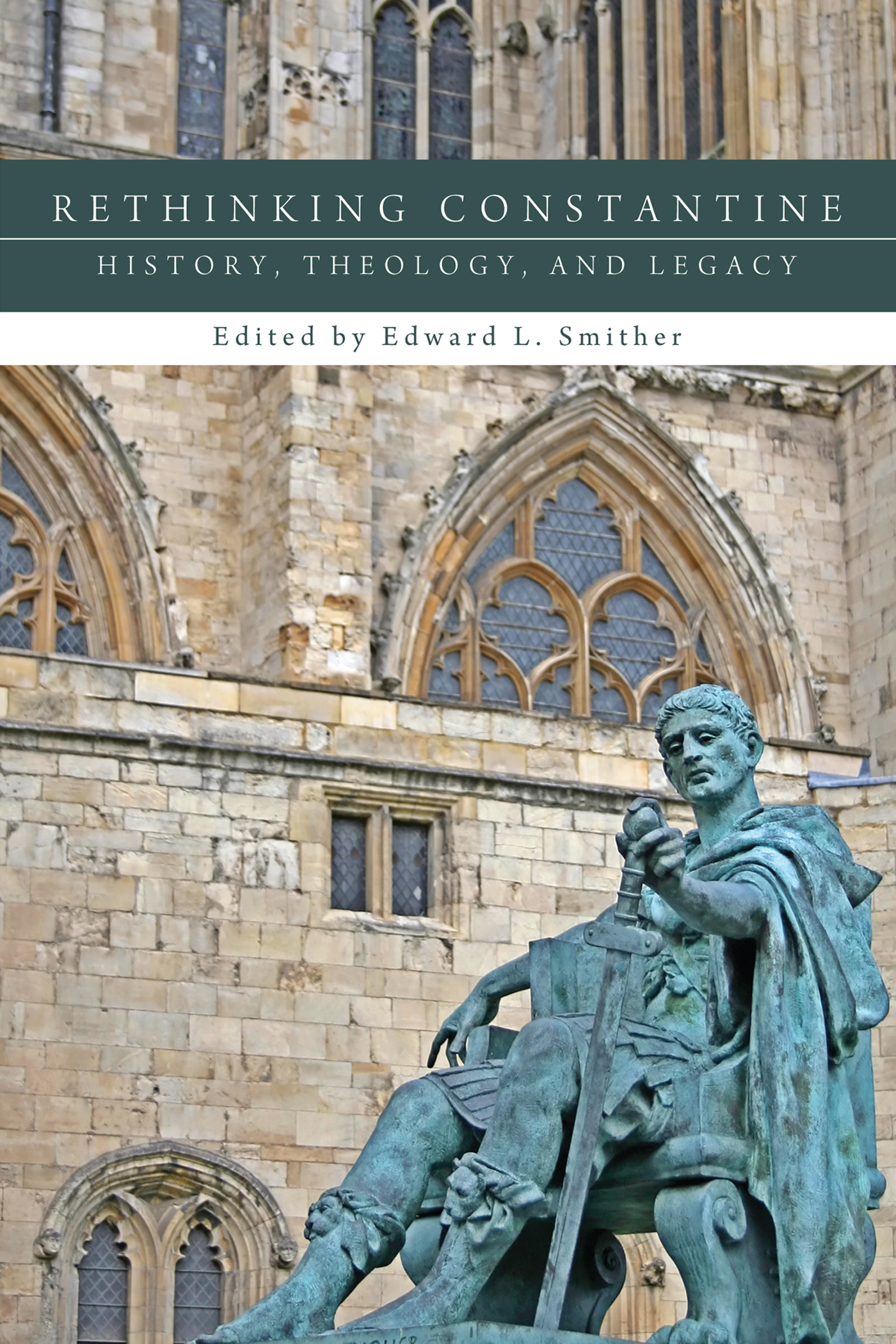Edward L. Smither
Copyright 2014 Wipf and Stock Publishers. All rights reserved. Except for brief quotations in critical publications or reviews, no part of this book may be reproduced in any manner without prior written permission from the publisher. Write: Permissions, Wipf and Stock Publishers, W. th Ave., Suite , Eugene, OR 97401 .
W. th Ave., Suite
Rethinking Constantine : history, theology, and legacy / edited by Edward L. Smither.
x + pp. ; cm. Includes bibliographical references and index.
. Constantine I, Emperor of Rome, Religion.. Constantine I, Emperor of Rome, Influence.. Leithart, Peter J. Defending Constantine. I. Smither, Edward L. II. Title.
Manufactured in the U.S.A.
Abbreviations
ANFAnte-Nicene Fathers
Anthol. Gr.Anthologia Graeca (Greek Anthology)
App. Optatus , Appendices to De Schismate Donastistarum (Against the Donatists)
Brev. Coll. Augustine , Breviculus conlationis cum Donatistis (Summary of the meeting with the Donatists)
CCGTPCorpus Christianorum Thesaurus Patrum Graecorum
CCSGCorpus Christianorum Series Graeca
CCSL Corpus Christianorum Series Latina
CSELCorpus Scriptorum Ecclesiasticorum Latinorum
CThCodex Theodosianus
Comm. in Is. Eusebius, Commentarius in Isaiam (Commentary on Isaiah)
Cresc. Augustine , Contra Cresconium Donatistam (Against Cresconius the Donastist)
DI Lactantius, Divinae institutiones (Divine Institutes)
Ep.Epistulae (letters) from various authors
FCFathers of the Church
GCSDie Griechischen Christlichen Schriftsteller
HEHistoria ecclesiastica (Ecclesiastical History) from various authors (Eusebius, Philostorgius, Rufinus, Sozomenus, Theodoret, and Socrates)
HE gent. Angl Bede, Historiam ecclesiasticam gentis Anglorum (Ecclesiastical History of the English People)
ID Lactantius, De Ira Dei (On the Anger of God)
JECSJournal of Early Christian Studies
JEHJournal of Ecclesiastical History
JTSJournal of Theological Studies
LCL Loeb Classical Library
MP Lactantius, De Mortibus persecutorum (On the Manner in which the Persecutors Died)
NPNFNicene Post-Nicene Fathers
OD Lactantius, De Opificio Dei (On the Workmanship of God)
Optatus Optatus , De Schismate Donastistarum (Against the Donatists)
PGPatrologia Graeca
PLPatrologiae Latinae
Paneg. lat.Panegyric latini
SCSources Chrtiennes
TDNTTheological Dictionary of the New Testament
TUTexte und Untersuchungen
VC Eusebius , Vita Constantini (The Life of Constantine)
VCol. Admomnan, Vita Columbae (The Life of Columba)
Vir. ill. Jerome, De Viris illustribus (Illustrious Men)
Contributors
David C. Alexander (PhD, University of Edinburgh) is Assistant Professor of Church History at Liberty University and is the author of Augustines Early Theology of the Church.
Jonathan J. Armstrong (PhD, Fordham University) is Assistant Professor of Bible and Theology at Moody Bible Institute (Spokane, WA). He is the translator of Eusebius Commentary on Isaiah in the Ancient Christian Texts series.
Paul A. Hartog (PhD, Loyola University Chicago) is Associate Professor of New Testament and Early Christian Studies at Faith Baptist Theological Seminary and his works include The Contemporary Church and the Early Church, Polycarp and the New Testament, and a commentary on Polycarps Epistle to the Philippians and the Martyrdom of Polycarp.
Bryan M. Litfin (PhD, University of Virginia) is Professor of Theology at Moody Bible Institute. His previous books include Getting to Know the Church Fathers: An Evangelical Introduction and the Chiveis Trilogy.
W. Brian Shelton (PhD, Saint Louis University) is Professor of Theology and Church History and Vice President for Academic Affairs at Toccoa Falls College. He is the author of Martyrdom from Exegesis in Hippolytus: An Early Church Presbyters Commentary on Daniel.
Edward L. Smither (PhD, University of Wales-Trinity St. David; PhD, University of Pretoria) is Professor of Intercultural Studies at Columbia International University and the author of Augustine as Mentor: A Model for Preparing Spiritual Leaders, Brazilian Evangelical Missions in the Arab World, and translator of Franois Decrets Early Christianity in North Africa.
Glen L. Thompson (PhD, Columbia University) is currently Academic Dean and Professor of New Testament and Historical Theology at Asia Lutheran Seminary (Hong Kong) and author of The Augsburg Confession: A New Translation with Historical Notes and The Correspondence of Pope Julius I .
Introduction
Edward L. Smither
O n the eve of his battle against Maxentius at Milvian Bridge in , Flavius Valerius Constantinus (ca. /) reportedly saw a symbol in the sky, which played a role in his conversion to faith in the Christian God. Victorious at Milvian Bridge, Constantine took control of the western empire and then, after victory over his rival Licinius in , he emerged as the sole Roman emperor ruling until his death in . Mark Noll, in his introductory work on Christian history Turning Points , correctly notes that In the long view, Constantines victory at Milvian Bridge was much more important for the history of Christianity than for the history of Rome. He adds that Constantines vision on the eve of battle changed the course of his life as well as the course of the Christian church. Indeed, during his lifetime, Constantine gave peace and preference to the church and set into motion a relationship between church and state that has never been the same.
What happens to the church when the emperor becomes a Christian? Should such a triumph be perceived as Gods will and the fulfillment of prophecy? Or, was it the beginning of compromise and worldly captivity for a pilgrim people? Constantines lifehis career, faith, and relationship to the churchraises questions for Christians and for historians of the church that cannot be ignored. Scholars continue to be intrigued with Constantine the man, his motivations for Christian faith, the influence he wielded over the church, and the paradigm that he introduced for church-state relations. While some have approached the study of Constantine as Roman historians with little interest in religion, others have endeavored to make sense of Constantine through the lenses of theology. The amount of scholarship on Constantine in recent years, 1700 years after Milvian Bridge, continues to bear witness to the seismic paradigm shift that his life and reign initiated.
The aim of the present work is to reassess our picture of Constantine through careful historical inquiry largely within the scope of the early Christian period. Our approach is threefold: to re-examine the history surrounding Constantines life, to consider his connection to the development of Christian theology, and to then assess his legacy regarding the church. In the opening chapter, Glen Thompson begins by summarizing the most important recent literature on the emperor. Next, through a careful look at the sources, he engages the important question of Constantines conversion and Christian faith. Though approaching the issue historically, Thompson interprets Constantines story within the Lutheran framework of simul iustus et peccator that followers of Christ (even monarchs) are righteous sinners. In chapter , Brian Shelton examines Constantines story through the eyes of Lactantius (d. )the African rhetor who had served in Diocletians court and tutored at least one of Constantines sons. As far more scholarly energy has gone into exploring Eusebius of Caesareas take on the events, Sheltons articleframed by the motif of architectureoffers a timely look at Lactantius, a source who was closer to the emperor than Eusebius and who wrote in an earlier period. In a very thorough third chapter, David Alexander re-examines the Donatist issuethe first church controversy in which the emperor chose to get involved. Alexander carefully reviews recent scholarship on the African movement and the narrative of the emperors response. In short, the author shows not only how Constantines engagement with the Donatists would shape his intervention on other church matters (such as Arianism), but he also lays the groundwork for an early Christian understanding of church and state that would continue through the first millennium.


